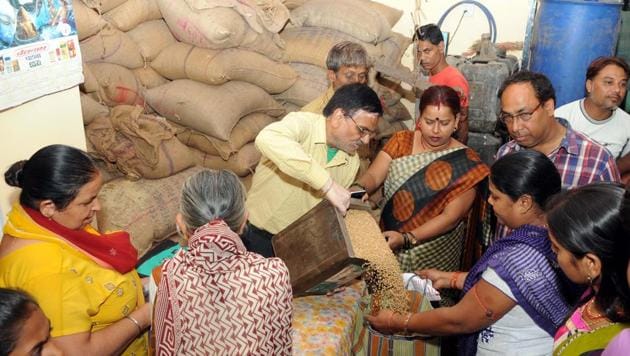News Highlight
The Chief Justice of India agreed to hear the Nagrik Apurti Nigam (NAN) scam case in the Supreme Court, which is related to Public Distribution System Scam in Chhattisgarh.
Key Takeaway
- The opposition alleged that the government was distributing sub-standard quality grains under the PDS and that officials had received kickbacks from rice millers to allow this.
- The Nagrik Apurti Nigam is Chhattisgarh’s nodal agency for procuring and distributing food grains under the Public Distribution System (PDS).
What is the Public Distribution System?
- The Public Distribution System (PDS) is an Indian food security system which evolved as a system for distributing food grains at affordable prices and managing emergency situations.
How does the PDS system function?
- Role of the central government
- The centre procures food grains from farmers at a minimum support price (MSP) and sells them to states at central issue prices.
- It is responsible for transporting the grains to godowns in each state.
- Role of the state’s governments
- States are responsible for transporting food grains from these godowns to each fair price shop.
- Identification of eligible families.
- Issue ration cards.
Significance of the PDS
- Food and nutritional security
- The PDS helps in ensuring the food and nutritional security of the nation.
- Food inflation
- The PDS has helped stabilise food prices and make food available to the poor at affordable prices.
- Better return for farmers
- The minimum support price and procurement system have contributed to the increase in food grain production.
- Re-distribution
- PDS helps to re-distribute grains by supplying food from surplus regions to deficit regions.
Challenges and issues
- Identification of beneficiaries
- Significant errors occur in the exclusion and inclusion of Below Poverty Line (BPL) and Above Poverty Line (APL) families in beneficiary data.
- The problem of targeting is compounded by the need for good quality regular data; no regular official estimates of the actual income of households.
- Wastage
- A performance audit by the Comptroller and Auditor General of India (CAG) has revealed a severe shortfall in the government’s storage capacity.
- Financial burden
- There are also concerns regarding the financial feasibility of such a system.
- The centre bears a significant financial burden, the food subsidy because the cost of procuring and delivering food grains is about six times its sale price.
- Inconsistent quality
- Most respondents reported that the ratio quality is inconsistent.
- The complaints were mainly about the bad quality of wheat. Some of the recipients wanted a better quality of wheat and rice.
- Corruption and leakages
- Despite several significant, system-wide changes over recent years, high levels of corruption and leakage continue to plague the PDS.
Initiatives
- National Food Security Act, 2013
- Under this, beneficiaries under the National Food Security Act fall into two categories: Priority Households (PHH) and Antyodaya Anna Yojana (AAY) households, each of which is entitled to 35 kg of food grains each month (5 kg per person per month).
- Wheat costs Rs. 2 per kg, rice costs Rs. 3 per kg and coarse grains cost Rs. 1 per kg.
- Aadhaar seeding of PDS
- It refers to entering Aadhaar numbers for each household member on the ration card.
- Seeding is a pre-requisite for the Aadhaar-based Biometric Authentication (ABBA) system.
- ABBA is a practice of using an electronic point of sale (PoS) machine to authenticate each transaction in the PDS.
- Depot Online System
- Depot Online System is a solution for managing the end-to-end operations of Food Corporation of India (FCI) Depots.
- The Key Objective of the Depot Online System is to align with the ‘Digital India’ vision for the transformation of the food distribution supply chain in India.
Way forward
- End to End computerisation
- The Justice Wadhwa Committee Report for PDS (2011) recommended the computerisation of PDS for two reasons: one, to prevent diversion and second, to enable secure identification at ration shops.
- Digitalisation
- States such as Chhattisgarh and Madhya Pradesh have implemented IT measures to streamline Targeted Public Distribution System (TPDS) through the digitisation of ration cards, the use of GPS tracking of delivery, and the use of SMS-based monitoring by citizens.
- Direct Cash Transfers
- For checking leakage and diversions, the Government is also pursuing with States/UTs to opt for Direct Benefit Transfer (DBT), under which a subsidy component will be credited to the bank accounts of beneficiaries to ensure their entitlement, making them free to buy foodgrains from anywhere in the market.
- Improving storage capacities
- The storage capacities have been augmented across the country using funds under plan schemes and private investment in Public Private Partnership (PPP) mode.
- Checking corruption
- Every State/UT Government is required to set up Vigilance Committees at the State, District, Block and Fair Price Shop (FPS) level.
- These Committees regularly supervise the implementation of all the schemes covered under the National Food Security Act and inform the District Grievance Redressal Officer in writing of any violation and any misappropriation of funds.
- Door-step Delivery
- The doorstep delivery of grains would help mitigate corruption.
Content Source: The Hindu



